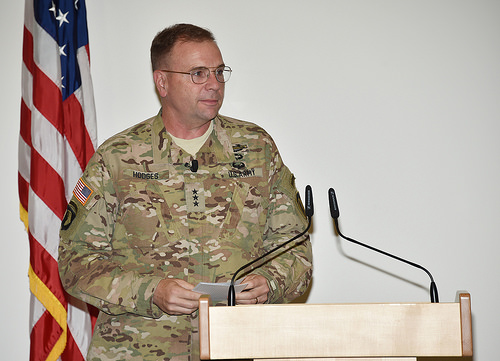 US command and control networks take too long to link to allies and respond to Russia’s rapid-fire aggression. In Ukraine, “we’ve had at least two, maybe three of these cycles [already, where] they’ll back off, and there’ll be a long kind of quiet period, and then they’ll spike back up,” Lt. Gen. Ben Hodges the Army’s top commander in Europe tells me. The Russians could re-escalate quickly in Ukraine — or anywhere along an arc from the Arctic to the Baltic to the Black Sea….
US command and control networks take too long to link to allies and respond to Russia’s rapid-fire aggression. In Ukraine, “we’ve had at least two, maybe three of these cycles [already, where] they’ll back off, and there’ll be a long kind of quiet period, and then they’ll spike back up,” Lt. Gen. Ben Hodges the Army’s top commander in Europe tells me. The Russians could re-escalate quickly in Ukraine — or anywhere along an arc from the Arctic to the Baltic to the Black Sea….
There are three missing pieces, Hodges said:
1. Secure FM radios so US troops can talk securely and to allies without being jammed;
2. Shared data that allows troops to see a common operating picture (COP), so that US and allied commanders see the same situation on their screens.
3. Secure digital networks to call in artillery fire by linking human observers and radars to the guns themselves.
“Right now we do not have, universally, any of those three,” Hodges said. Some of the key decisions are well above a three-star general’s paygrade, he added: “There’s policy decisions to be made [and decisions] in the acquisition process.” For example, Harris makes a “great radio” that both the US and many allies use, he said, but export rules require the company put a different kind of encryption on radios sold abroad, making them incompatible with American ones….
The humans under Gen. Hodges’ command are adapting much more rapidly than the machines, he said.”When I was a captain, I’d never met an ambassador, never had an interview with anything other than the post newspaper, and I’d certainly never served under a foreign officer,” he said. “That’s routine now for our captains.”
On many deployments, in fact, a young captain is the most senior US officer in an entire country. Hodges said. “The minister of defense or prime minister or the chief of defense, they knew that captain by his first name,” he said, “because they’re living in host-nation barracks and they’re training with those host nation forces….
“Ukraine is only a symptom of what’s going on,” Hodges said. “Russia believes that they’re entitled to a sphere where they can dictate what countries do.”
That sphere encompasses new bases in the Arctic, a new base in Belarus, Russian advisors and weapons in separatist-held Ukraine, and Russian regulars on territories claimed by both Moldova (Transnistria) and Georgia (Abkhazia and South Ossetia). A Russian official even made a nuclear threat against little Denmark. Former territories of the Russian Empire — Finland, Poland, the Baltic States — are particularly worried. As Hodges put it, “if you’ve had your nation disappear off the map because of Russia, I think you’re entitled to a little bit of concern of it happening again.”
It’s particularly important to get a deterrent force in place before the Russians slam the door on reinforcements. Anti-aircraft and anti-ship missiles based on Russian or Russian-occupied soil can already range well into NATO airspace and waters. If a shooting war were in the offing, Hodges said, “the investments the Russians have made in Kaliningrad and Crimea in access denial would make it very, very risky and costly to try to bring capabilities up into the Baltic Sea and the Black Sea.”
“In order to deter a situation where they might decide to deny access, launch a snap exercise, and Little Green Men [Russian special forces] start appearing in Latvia, for example, or they start to seal off the gap [of Polish and Lithuanian territory] between Kaliningrad and Belarus, we’ve got to be there [already],” Hodges said. “We’ve got to be training with our allies, improving interoperability, and we’ve got to be able to move quickly [to] provide a deterrent option before it grows into a crisis.”
Image: Gen. Ben Hodges, Commander of US Army Europe, Aug. 6, 2015 (photo: Karl-Heinz Wedhorn/George C. Marshall Center)
